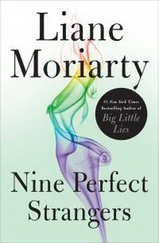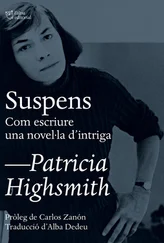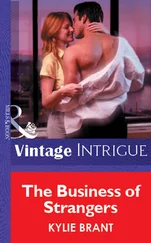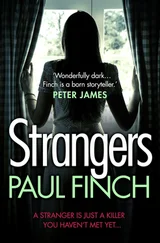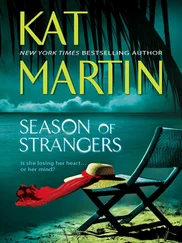He awakened at the edge of a woods, face down on a downward sloping hill. Had he awakened, or had he fallen only a moment ago? But there was grayness in the sky in front of him, the beginning of dawn, and when he stood up, his flickering vision told him he had been unconscious. His fingers moved directly to the mass of hair and wetness that stood out from the side of his head. Maybe my head is broken, he thought in terror, and stood for a moment dully, expecting himself to drop dead.
Below, the sparse lights of a little town glowed like stars at dusk. Mechanically, Guy got out a handkerchief and wrapped it tight around the base of his thumb where a cut had oozed blacklooking blood. He moved toward a tree and leaned against it. His eyes searched the town and the road below. There was not a moving thing. Was this he? Standing against the tree with the memory of the gun’s explosion, the sirens, the fight against the woods? He wanted water. On the dirt road that edged the town, he saw a filling station. He made his way down toward it.
There was an old-fashioned pump beside the filling station. He held his head under it. His face stung like a mask of cuts. Slowly his mind grew clearer. He couldn’t be more than two miles from Great Neck. He removed his right glove that hung by one finger and the wrist, and put it in his pocket. Where was the other? Had he left it in the woods where he tied his thumb? A rush of panic comforted him with its familiarity. He’d have to go back for it. He searched his overcoat pockets, opened his overcoat and searched his trousers pockets. His hat fell at his feet. He had forgotten about the hat, and suppose he had dropped that somewhere? Then he found the glove inside his left sleeve, no more than the seam of the top that still circled his wrist, and a tatter, and pocketed it with an abstract relief like happiness. He turned up a trousers cuff that had been torn ~ down. He decided to walk in the direction he knew was southward, catch any bus farther southward, and ride until he came to a railroad station.
As soon as he realized his objective, pain set in. How could he walk the length of this road with these knees? Yet he kept walking, holding his head high to urge himself along. It was a time of dubious balance between night and day, still dark, though a low iridescence lay everywhere. The dark might still overcome the light, it seemed, because the dark was bigger. If the night could only hold this much until he got home and locked his door!
Then daylight made a sudden thrust at the night, and cracked the whole horizon on his left. A silver line ran around the top of a hill, and the hill became mauve and green and tan, as if it were opening its eyes. A little yellow house stood under a tree on the hill. On his right, a dark field had become high grass of green and tan, gently moving like a sea. As he looked, a bird flew out of the grass with a cry and wrote a fast, jagged, exuberant message with its sharp-pointed wings across the sky. Guy stopped and watched it until it disappeared.
Twentyfour
For the hundredth time, he examined his face in the bathroom mirror, patiently touched every scratch with the styptic pencil, and repowdered them. He ministered to his face and hands objectively, as if they were not a part of himself. When his eyes met the staring eyes in the mirror, they slipped away as they must have slipped away, Guy thought, that first afternoon on the train, when he had tried to avoid Bruno’s eyes.
He went back and fell down on his bed. There was the rest of today, and tomorrow, Sunday. He needn’t see anyone. He could go to Chicago for a couple of weeks and say he was away on a job. But it might seem suspicious if he left town the day after. Yesterday. Last night. Except for his scratched hands, he might have believed it one of his dreams that he had done it. Because he had not wanted to do it, he thought. It had not been his will. It had been Bruno’s will, working through him. He wanted to curse Bruno, curse him aloud, but he simply had not the energy now. The curious thing was that he felt no guilt, and it seemed to him now that the fact Bruno’s will had motivated him was the explanation. But what was this thing, guilt, that he had felt more after Miriam’s death than now? Now he was merely tired, and unconcerned about anything. Or was this how anyone would feel after killing? He tried to sleep, and his mind retraced the moments on the Long Island bus, the two workmen who had stared at him, his pretense of sleep with the newspaper over his face. He had felt more shame with the workmen….
His knees buckled on the front steps and he almost fell. He did not look to see if he were being observed. It seemed an ordinary thing he did, to go down and buy a paper. But he knew also he hadn’t the strength to look to see if he were being observed, the strength even to care, and he dreaded the time when the strength would come, as a sick or wounded man dreads the next inevitable operation.
The Journal-American had the longest account, with a silhouette of the murderer, composed from the butler’s description, of a man six feet one, weighing about one hundred and seventy to eighty pounds, wearing a dark overcoat and hat. Guy read it with mild surprise, as if it might not have been about him: he was only five nine and weighed about a hundred and forty. And he had not been wearing a hat. He skipped the part of the story that told who Samuel Bruno was, and read with greatest interest the speculation about the murderer’s flight. North along Newhope Road, it said, where it was believed he lost himself in the town of Great Neck, perhaps taking the 12:18 A.M. train out. Actually, he had gone southeast. He felt suddenly relieved, safe. It was an illusion, he warned himself, safety. He stood up, for the first time as panicked as he had been when he floundered in the lot beside the house. The paper was several hours old. They could have found their mistake by now. They could be coming for him, right outside his door, by now. He waited, and there was no sound anywhere, and feeling tired again, he sat down. He forced himself to concentrate on the rest of the long column. The coolness of the murderer was stressed, and the fact it seemed to be an inside job. No fingerprints, no clue except some shoe prints, size nine and a half, and the smudge of a black shoe on the white plaster wall. His clothes, he thought, he must get rid of his clothes and immediately, but when would he find the energy to do it? It was odd they overestimated his shoe size, Guy thought, with the ground so wet.”… an unusually small caliber of bullet,” the paper said. He must get rid of his revolver, too. He felt a little wrench of grief. He would hate that, how he would hate the instant he parted from his revolver! He pulled himself up and went to get more ice for the towel he was holding against his head.
Anne telephoned him in the late afternoon to ask him to go to a party with her Sunday night in Manhattan.
“Helen Heyburn’s party. You know, I told you about it.”
“Yes,” Guy said, not remembering at all. His voice came evenly, “I guess I don’t quite feel like a party, Anne.”
For the last hour or so, he had felt numb. It made Anne’s words distant, irrelevant. He listened to himself saying the right things, not even anticipating, or perhaps not even caring, that Anne might notice any difference. Anne said she might get Chris Nelson to go with her, and Guy said all right, and thought how happy Nelson would be to go with her because Nelson, who had used to see a great deal of Anne before she met Guy, was still in love with her, Guy thought.
“Why don’t I bring in some delicatessen Sunday evening,” Anne said, “and we’ll have a snack together? I could have Chris meet me later.”
“I thought I might go out Sunday, Anne. Sketching.”
Читать дальше




